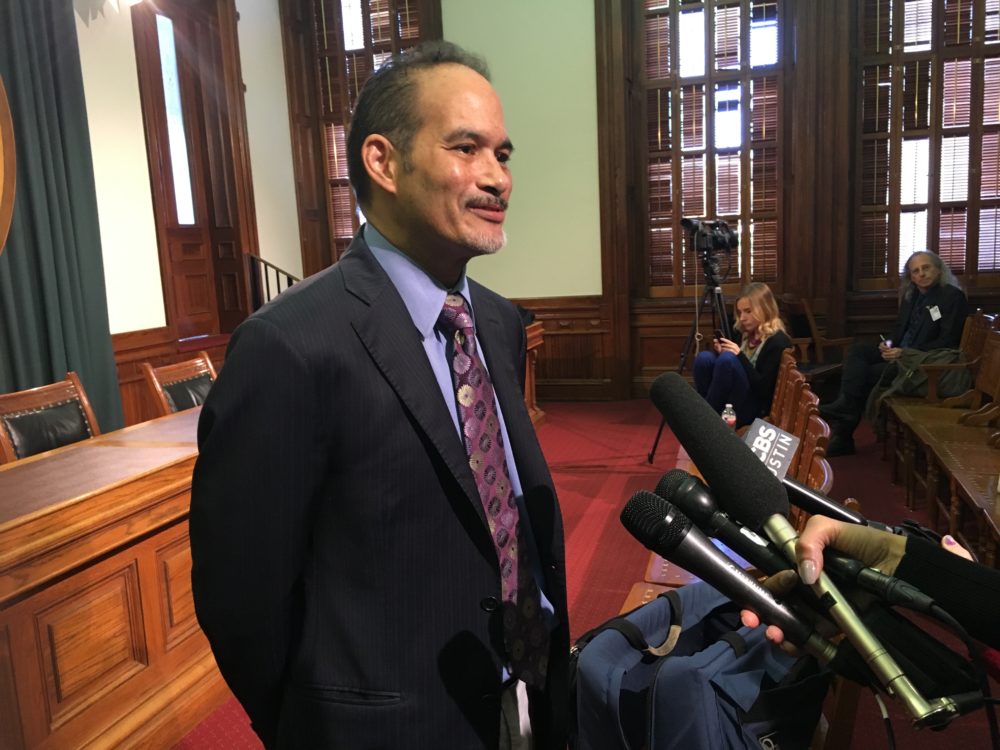Texas state Rep. Garnet Coleman, one of the most senior members of the Texas Legislature, has announced he will not run for reelection. The Houston Democrat has represented parts of central and southeast Houston in House District 147 since 1991. Since 2009, he has served as chair of the House County Affairs Committee.
Coleman’s decision comes in the midst of at least 20 other House members announcing they will not seek reelection
Coleman told Texas Standard that his health and the physical demands of his job, along with the changed climate in the Texas House, led him to end his legislative career.
Listen to the interview above or read the transcript below.
This transcript has been edited lightly for clarity:
Texas Standard: You’ve said you’re leaving the House primarily for health reasons. I know this was a difficult year for you. You had an infection that led to part of your leg being amputated, and your health kept you from joining House Democrats who went to Washington to try to block an elections bill. How are you feeling right now?
Rep. Coleman: I feel a lot better. The infection that created the need for the amputation has been resolved. And my diabetes is under control. And my bipolar disorder is under control. The problem with having these chronic illnesses is it slows you down. I’m probably harder on myself than anyone else because I want to be 30 again and without illnesses. It’s a physical and emotional job to be a member of the Legislature.
How did you make that final decision that you wouldn’t be coming back, with so many years in public service? Clearly that wasn’t lightly undertaken.
No, it wasn’t. When I looked at this last session we just went through, and a lot of the changes in how state government is operated, I just didn’t see myself in a position where I could add much more value to my constituents. And this was a very tough session in terms of the type of policy that was done. And so, why sit there another decade and not be able to do anything?
Another decade? Do you think that that’s what Democrats are looking at right now?
It’s anywhere from six years to 10 or more.
I don’t hear the “blue wave” talk very much anymore, but there’s a strong candidate running now for governor of Texas on the Democratic side. You’ve got a lot of people who are fired up after all that happened in this past legislative session, and what they perceive as a rightward turn.
No doubt about it. What people have to remember is, I was there when [Tom] Craddick was elected speaker, and no one thought that would last 20 years, and it has.
You’ve also said you’re frustrated with the political climate in the Texas House. Has that climate changed in your estimation? What is your hope for the future?
Oh, the climate has definitely changed. There’s a competition for who can be the most draconian when it comes to our statewide leadership. I appreciate what the Speaker has done. I was an early supporter of Speaker [Dade] Phelan and I was an early supporter of [Dennis] Bonnen. I was an early supporter of [Joe] Straus. But they can’t control the overall demand of by the different officials who want it to be more and more draconian and taken back in time, in terms of how we deal with life in Texas.
And so, yes, I’m certainly optimistic. After 30 years, I would have to be, because I’ve supported every [Democratic] gubernatorial candidate since Ann Richards. So it’s not that it makes me better, but I understand the environment a little better than some other people.
I mentioned a little earlier that at least 20 other House members have announced they won’t be seeking reelection. Do you think that some other lawmakers are coming to the same conclusion as you? Or does this have to do more with redistricting?
First of all, I think it has to do more with redistricting. This many seats change over during redistricting all the time. When I went in, it got up to 50, so this is a natural changeover. For some people, it takes longer to make that change. Some people, 10 years is enough or 15 years is enough. And I also thought, if it’s not fulfilling, why do it?
And that’s what it came down to for you: it just wasn’t fulfilling?
Yeah, it ceased to be fulfilling because it’s hard work. I mean, I wrote the budget. I’m not one of these people who doesn’t work hard and doesn’t do policy. But when my health equity bill is killed because it’s called “critical race theory” – when we see in the news day to day that we have one of the worst disparities in health care than almost any other state.
I know you spent many years fighting for children to have access to health insurance. So who picks that up from you?
We have a lot of members who want to do that work. We have a lot of members like Donna Howard who can do that work from the Appropriations Committee. Because you have to really have both – you have to be either Human Services, which is doing Medicaid and appropriations, and that’s where I was able to do a lot of different things by having that role.
And I think there are many people who can and will do that, because those are the roles that they have. You don’t necessarily have to be a committee chair to do that. We have other members who have been deferential, but I think they can take the lead very easily.
What do you consider your biggest accomplishment during your many years in office?
Expanding health insurance for children and adults and increasing funding for mental health. But the pinnacle was working directly with the Obama administration to write and pass the Affordable Care Act.
What’s next for you?
I’ve created a think-and-do tank called the Center for Civic and Public Policy Improvement. Started thinking about that in 1999. So we’ll work on these same issues. I will find some way to continue to add value. I may go to a university or I may seek appointed office. I could probably serve some more, but I couldn’t do the campaign. That’s the real issue – I just, I can’t. I have a lot of time left in and I will intervene and work on the policy side of life, either in government or the private sector or academia. And I look forward to that. But in the meantime, I want to make sure that I’m completely healthy and use this last, hopefully couple of decades of my life to do good things and not have illness stop it.














